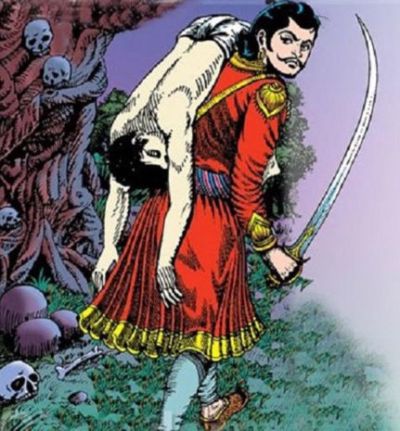“This body is impure, and gathers dirt from the day it is born. It is the abode of all pain, and will perish anyway, one day or the next.”
“The wise say that the only permanence in this creation is merit, and merit is acquired by this very body.”
“And what greater merit can there be in this world, other than serving all of creation? If I cannot show devotion to even my own parents, then of what use is this body of mine?”

इत्यादिवाक्यैः स शिशुः शोचन्तौ दृढनिश्चयः ।
ताव् अङ्गीकारयामास पितरौ स्वमनीषितम् ॥ १२,२७.१०९ ॥
गत्वा च राजभृत्येभ्यः प्रतिमां तं हिरण्मयीम् ।
आनीय प्रददौ ताभ्यां सग्रामशतशासनाम् ॥ १२,२७.११० ॥
ततः कृत्वाग्रतो राजभृत्यांस् तान् एव स द्रुतम् ।
पितृभ्याम् अन्वितः प्रायाच् चित्रकूटं नृपान्तिकम् ॥ १२,२७.१११ ॥
And so the brave boy, determined to go ahead with his plans, managed to make his weeping parents consent to his wishes.
He then went back to the king’s servants, and they brought to his parents, that statue of gold, and a grant for a hundred villages. He boy handed these over to his parents, and then they all set out to meet the king at Citrakūṭa.
तत्र चन्द्रावलोकस् तं वीक्ष्याखण्डिततेजसम् ।
रक्षारत्नम् इव प्राप्तं बालं राजा ननन्द सः ॥ १२,२७.११२ ॥
आरोप्य गजपृष्टं च रचितस्रग्विलेपनम् ।
नीनाय तं सपितृकं केतनं ब्रह्मरक्षसः ॥ १२,२७.११३ ॥
तत्र मण्डलम् आलिख्य तस्याश्वत्थस्य पार्श्वतः ।
विहितोचितपूजेन हुते वह्नौ पुरोधसा ॥ १२,२७.११४ ॥
King Candrāvaloka beheld the boy who stood before him, his courageous demeanor, and the tej (glow) on his face, and he was delighted.
He ordered for the boy to be clothed in fine garments, with garlands of flowers with the sweetest of smells, and had him sit on an elephant, and with his parents, took him to the place where he had seen Jvālāmukha.
As he reached the place…
to be continued…
